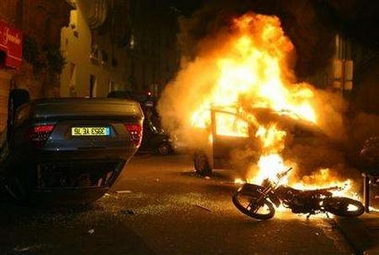France braced for mass protests on Saturday
against a new employment law as unions said more than 1 million people would
march to increase pressure on the government to repeal the measure.
Opposition to the new contract has provoked a serious crisis for the
government of Prime Minister Dominique de Villepin as it has mobilized students,
the left-wing opposition and unions.
|

Flames erupt from a
car and a motorbike in front of a hotel during clashes between youths and
police that followed a student protest against the First Employment
Contract (CPE), in Paris, March 16, 2006. [Reuters]
|
In a bid to further increase pressure, a key union leader said the march
could be followed by a general strike.
"If they don't listen to us we are going to have to think about moving to a
general strike across the whole country," said Bernard Thibault, head of the
Confederation of General Workers union, one of France's largest.
"I'm optimistic ... that the government will finally take notice of the
situation they've created for themselves," he said on France 3 television,
adding the march would top the March 7 rallies when unions said 1 million people
took to the streets.
Villepin says his First Job Contract will help young people find jobs,
crucial because youth unemployment is more than double the national average and
rises to 50 percent in some poor suburbs where it was a factor behind riots in
November.
But the law allows employers to dismiss people under 26 at any time during a
2-year trial period and that would destroy job security, critics say.
"I would say 'no' (to a job offered under the law) because I would have no
security for two years," Jerome Desprol, 24, told Reuters.
DIALOGUE
In a bid to defuse the crisis President Jacques Chirac said on Friday the
government was "ready for dialogue" on the law but student groups and unions
said his administration must withdraw it before talks can take place.
Analysts say any retreat by Villepin would damage his chances if he runs for
the presidency in 2007 and could harm the prospects for his UMP party, headed by
Interior Minister Nicolas Sarkozy who is another possible candidate at the
election.
In an indication of the possible danger to the government, an opinion poll
published in Friday's Le Parisien newspaper showed 68 percent of French people
oppose the law, a rise of 13 percentage points in a week.
The dispute has provided a potential rallying point for the opposition
Socialists, weakened by divisions over Europe and humiliating defeat in the 2002
election, though commentators say they are yet to capitalize on the opportunity.
Some 71 people remained in custody on Friday a day after student protests led
to sporadic rioting including a confrontation at the prestigious Sorbonne
university in Paris.
University chancellors met Villepin and called for an immediate suspension of
the law while negotiations on youth employment take place and said government
efforts to explain the law had been inadequate.
"We told him about our very serious concerns about the situation. We told him
that things are getting worse and that next week could prove very risky," said
Yannick Vallee, vice president of the association of university presidents.